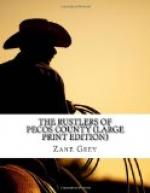Diane questioned me also about a rumor that had come to her concerning George Wright.
He had wounded himself with a gun, it seemed, and though not seriously injured, was not able to go about. He had not been up to the ranch for days.
“I asked papa about him,” said, Diane, “and papa laughed like—well, like a regular hyena. I was dumbfounded. Papa’s so queer. He looked thunder-clouds at me.
“When I insisted, for I wanted to know, he ripped out: ’Yes, the damn fool got himself shot, and I’m sorry it’s not worse.’
“Now, Russ, what do you make of my dad? Cheerful and kind, isn’t he?”
I laughed with Sally, but I disclaimed any knowledge of George’s accident. I hated the thought of Wright, let alone anything concerning the fatal certainty that sooner or later these cousins of his were to suffer through him.
Sally did not make these rides easy for me, for she was sweeter than anything that has a name. Since the evening of the dance I had tried to avoid her. Either she was sincerely sorry for her tantrum or she was bent upon utterly destroying my peace.
I took good care we were never alone, for in that case, if she ever got into my arms again I would find the ground slipping from under me.
Despite, however, the wear and constant strain of resisting Sally, I enjoyed the ride. There was a charm about being with these girls.
Then perhaps Miss Sampson’s growing unconscious curiosity in regard to Steele was no little satisfaction to me.
I pretended a reluctance to speak of the Ranger, but when I did it was to drop a subtle word or briefly tell of an action that suggested such.
I never again hinted the thing that had been such a shock to her. What was in her mind I could not guess; her curiosity, perhaps the greater part, was due to a generous nature not entirely satisfied with itself. She probably had not abandoned her father’s estimate of the Ranger but absolute assurance that this was just did not abide with her. For the rest she was like any other girl, a worshipper of the lion in a man, a weaver of romance, ignorant of her own heart.
Not the least talked of and speculated upon of all the details of the jail incident was the part played by Storekeeper Jones, who had informed upon his assailants. Steele and I both awaited results of this significant fact.
When would the town wake up, not only to a little nerve, but to the usefulness of a Ranger?
Three days afterward Steele told me a woman accosted him on the street. She seemed a poor, hardworking person, plain spoken and honest.
Her husband did not drink enough to complain of, but he liked to gamble and he had been fleeced by a crooked game in Jack Martin’s saloon. Other wives could make the same complaints. It was God’s blessing for such women that Ranger Steele had come to Linrock.
Of course, he could not get back the lost money, but would it be possible to close Martin’s place, or at least break up the crooked game?




